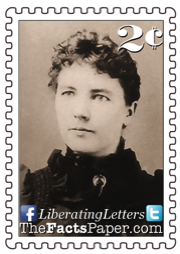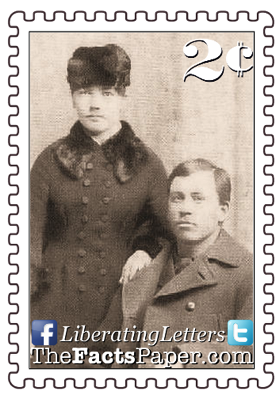February 10, 2018
Dear Liberty,
Laura sat at her desk as the realities of her financial situation began to sink in. Upon her marriage to “Manly” on August 25, 1885, 18-year-old Laura left her teaching career to assist her 28-year-old husband with their new farm. Now, forty years later, everything they worked for was gone. The 1929 Wall Street Crash not only wiped them out, but their daughter as well. Laura was going to have to start over. And the key to her future would come from her past.
When Laura and Manly started life together on their farm in 1885, the future seemed wide open. As a young married couple, they expected some hardships. Yet the birth of their only daughter Rose on December 5, 1886, was a definite bright spot in their lives. However, Manly contracted diphtheria in the Spring of 1888, which left him partially paralyzed. Despite recovering the use of his legs, he required the assistance of a cane the remainder of his life. The following year, their only son died just 12 days after birth.
The next several years were wrought with troubles and trials. Droughts, illnesses, and multiple fires that destroyed both their barn and home, left the Wilders in debt and wondering if they would ever catch a break. Following a short stay in Florida for Manly’s health, the family eventually settled in Mansfield, Missouri, where they purchased a piece of undeveloped land. Calling it Rocky Ridge Farm, they slowly began earning some financial stability. Developing a dairy farm and an apple orchard, Laura also volunteered for several clubs and local farm associations. As she gained recognition in these organizations, interest increased to hear her speak.
In 1911, the Missouri Ruralist asked Laura to contribute an article, which turned into columnist and editor positions. In addition, Laura worked with the Farm Loan Association, selling loans to local farmers. With Manly’s limitations due to his condition, Laura’s income provided much needed funds for the family.
Laura’s regular columns in the Ruralist gained her an audience of rural Ozarkians. Entitled “As a Farm Woman Thinks,” the columns discussed incidents in her everyday life to world events. She built a very successful writing career, seeming to secure their future and retirement. Likewise, their daughter Rose also achieved notoriety as a successful author, penning several biographies, including Herbert Hoover, Charlie Chaplin and Henry Ford. (see Liberty On The Prairie and Fording The Way)
Following the Roaring 20s, the Stock Market Crash wiped out all the finances for the Wilder’s and Rose. (see The Forgotten President) With the Great Depression just beginning, the Wilder’s and their daughter, who was now divorced and living on her own, needed a plan. Knocked down, but now out, Laura found inspiration in the success of her column, recording her childhood memories in an autobiography entitled Pioneer Girl. While publishers rejected the first person adult novel, Rose encouraged her to make some changes. Laura rewrote it as a third person children’s book, with herself as the main character. The adjustments proved to be the key as her first book was published in 1932 and became a fast bestseller.
Laura Elizabeth Ingalls was born in the Big Woods region of Wisconsin on February 7, 1867. Her parents, Charles and Caroline Ingalls, moved their family to Kansas in 1869 believing the land was open to settlers. Upon realizing their farm was actually located on the Osage Indian reservation, they returned to Wisconsin in the Spring of 1871. Her books Little House in the Big Woods (1932) and Little House on the Prairie (1935), are pulled from these periods, though Laura’s age was adjusted in the book from real life. Her second book, Farmer Boy (1933), was dedicated to her husband’s childhood in New York.
PIONEER GIRL

Laura continued her family’s adventures and moves throughout Missouri, Kansas, Iowa and Wisconsin in five more books. They lived in Walnut Grove, Minnesota, twice in the 1870’s, eventually settling in De Smet, South Dakota, where Mary, Laura’s sister, became ill and lost her eyesight. Even as a teenager, Laura understood the financial burden this placed on the family and the responsibility she had to contribute. Primarily self-taught due to the family’s numerous moves, Laura worked several part-time jobs while attending the local school when possible. However, just shy of her 16th birthday, Laura accepted her first teaching job in a one-room schoolhouse. She needed someone to take her to her job 12 miles away in the neighboring town. Likewise, she would need rides home on weekends. Her parents asked a local bachelor for assistance. It was during these rides that Almanzo “Manly” Wilder and Laura “Beth” Ingalls became very close friends, of which Laura recalls in her books.

Laura and Rose Wilder Lane continued to collaborate as the Little House series enjoyed growing popularity. Laura focused on children’s books while Rose found success with adult novels recounting both her Ingalls and Wilder histories. For the next several decades, Laura and her books grew to such notoriety that she daily received visitors at the farm just wanting to meet the famed author. Likewise, she and Almanzo finally enjoyed the financial stability they longed for for so many years.
After several months of severe illness, Laura passed away peacefully at home in her sleep in Mansfield, just 3 days after her 90th birthday, on February 10, 1957. She was laid to rest next to her beloved Manly, who died eight years earlier.
As a final tribute, South Dakota State Historical Society decided to publish Laura’s first novel in annotated form, Pioneer Girl: The Annotated Autobiography, in 2014. It includes several events Laura removed from her Little House series that she deemed not appropriate for children.
Beginning in 1971, Melissa Gilbert (as Laura) and Michael Landon (as Pa) starred in the television program based on the Little House series. Entitled Little House on the Prairie, Americans, especially children, learned what life was like in the Midwest in the 19th century from someone who lived it. Landon made sure to also include and hold true to the Ingall’s faith and trust in God as they endured the hardships of settling the West.
Laura Ingalls Wilder is a perfect example of a strong, independent woman, but more importantly, she was a survivor. Yet feminists degrade and demean people like her and her family because they don’t fit into their mold. While Little House became a staple of my life, it seems to depict everything the modern feminist is against. However, feminists fail to recognize the simple fact that a woman’s role was much different just 100 years ago, even though some women still choose that role today. Most women generally did not feel “stuck” in the house, understanding their presence was essential for their survival and the family’s. Frozen ready-made meals did not exist, nor did the plethora of fast food restaurants we enjoy toady. Food preparation alone required hours of time, including collecting, killing, preparing, cooking and canning. Washing could be an all day event, not to mention the vast majority of women made their own clothes, sheets, blankets, quilts and other necessities. It’s not that wives and mothers were prevented from working outside of the home. They just didn’t have the time. Plus, unless you lived in the city, farming and teaching were the main available occupations.
Society has entered a time of calling even a touch on an arm sexual harassment. Nevertheless, many still continue to belittle the principles shared in Little House On The Prairie, not understanding such values are actually the solution. One wonders if the classic series could even be made today. I grew up on it and it is what inspired me to become a teacher. It was also one of the few shows I watched that made no apologies about showing the characters in church, reading the Bible, and even praying to God. Christian values were respected, not a punch line. I learned I should respect my parents, listen to my elders, and see that a relationship was not based on how fast you can get someone in bed. The character of Nellie showed me I would encounter people I did not like, yet I should still be nice to them. Mary’s blindness taught me people will have trials and tribulations, but we continue to work through them and praise God for the blessings we have. The death of Laura’s baby brother, Charles, taught me heartache comes with being human. Little House had multiple stories of sacrifice, friendship, and neighbors helping neighbors. It addressed adoption and the loss of a child, marriage and the loss of a spouse, wealth, poverty, illnesses, drugs, bullying and unconditional love.
Yet even with all these good qualities, Hollywood and the left continue to reject and vilify such shows. Out of the blue, ABC abruptly and surprisingly canceled Tim Allen’s highly rated Last Man Standing following its 5th season, the only current show that honestly addressed Christianity, conservatism and family values. Instead, even Disney, a name synonymous with family friendly, is including gay characters in their Disney Channel original shows and contemplating making Queen Elsa a lesbian.
So, Liberty, since Hollywood refuses to share these wonderful stories with you, I get the pleasure of doing it. You are coming to the age the Little House series is written for. I can’t wait to relive the lives of the beloved Ingalls with you. While growing up, I always associated with Laura and Pa’s relationship. Now, grown up and a parent, I see us in Laura and her daughter Rose. I so look forward to this new chapter in our lives.
That’s my 2 cents.
Love,
Mom


